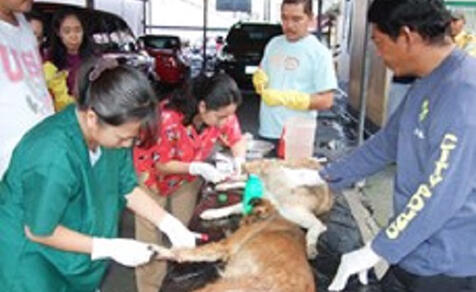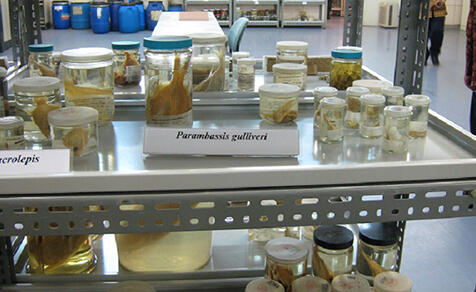Developing new medicines for infectious diseases- Studies based on Ghanaian medicinal plants -
Developing new medicines for infectious diseases
- Studies based on Ghanaian medicinal plants -
Research Fields and Areas
Infectious Diseases Control
SATREPS project : Studies of Anti-viral and Anti-parasitic Compounds from Selected Ghanaian Medicinal Plants
 The fight against HIV and AIDS is a global challenge requiring urgent action. Suppressing the progression of HIV to prevent the onset of AIDS is one approach that is becoming established, but it would be desirable to develop drugs that are effective against persistent, latent HIV infections. HIV prevalence in Ghana was 1.9% in 2007, and the rate is rising in some areas and among some demographics. For this reason, the nation makes combating HIV/AIDS one of its top priorities, having the Ghana AIDS Commission (GAC) operate directly under the office of the President. Another major infectious disease is trypanosomiasis, also known as sleeping sickness. Some forms of the disease affect animals as well as humans, and in Africa, as many as 50 million people and 25 million domestic animals are infected. Drugs currently used to treat trypanosomiasis have serious side effects, so there is a need for research and development to produce inexpensive but effective drugs.
The fight against HIV and AIDS is a global challenge requiring urgent action. Suppressing the progression of HIV to prevent the onset of AIDS is one approach that is becoming established, but it would be desirable to develop drugs that are effective against persistent, latent HIV infections. HIV prevalence in Ghana was 1.9% in 2007, and the rate is rising in some areas and among some demographics. For this reason, the nation makes combating HIV/AIDS one of its top priorities, having the Ghana AIDS Commission (GAC) operate directly under the office of the President. Another major infectious disease is trypanosomiasis, also known as sleeping sickness. Some forms of the disease affect animals as well as humans, and in Africa, as many as 50 million people and 25 million domestic animals are infected. Drugs currently used to treat trypanosomiasis have serious side effects, so there is a need for research and development to produce inexpensive but effective drugs.

Principal investigator (Japan):Professor YAMAOKA Shoji
Graduate School of Medical and Dental Sciences, Tokyo Medical and Dental University
M.D., Kyoto University. Surgeon in Kyoto and Niigata, then worked for a Ph.D. in Molecular Medicine at Kyoto University. Conducted research at the Institute for Virus Research, Kyoto University, and studied at the Unite de Biologie Moleculaire de l'Expression Genique, Institut Pasteur Paris, France, and became an Associate Professor at Tokyo Medical and Dental University before being appointed Professor and Chair in the university's Department of Molecular Virology, Graduate School of Medical and Dental Sciences in 2007.
 Japan perspective
Japan perspective
Japanese technology aids the search for new medicines
Over 3,000 different medicinal herbs grow wild in Ghana, but the active components have only been identified in about 1,000 of them. Very little progress has been made in analyzing their functions, testing them for safety, or screening for effectiveness against diseases other than those that they are currently used for. This research has potential for developing new, more effective treatments, and because it is based on extending and augmenting traditional healing practices that are ingrained in the locality, it is a good way of controlling infectious diseases and improving access to treatment for ordinary people.
Successful discoveries will benefit the whole world
The numbers of HIV/AIDS cases are growing in many countries, and even Japan is facing a steady increase. Development of effective and inexpensive treatment regimes would be welcomed worldwide.

Principal investigator (Ghana):Professor Alexander Kwadwo Nyarko
Director, Noguchi Memorial Institute for Medical Research
Concurrently Director of the Noguchi Memorial Institute for Medical Research and Director of the West African Centre for International Parasite Control. Graduated in biochemistry from Ghana University, then studied in the US. Principal research interests are clinical chemistry in relation to diabetes mellitus and hypertension; chemical induced toxic injury; and pharmacological and toxicological studies into plant medicines.
 Ghana perspective
Ghana perspective
Working together to make best use of local resources
Ghana is implementing drug-based treatment of AIDS/HIV in line with the WHO guidelines, but only a proportion of the people who need treatment are able to take advantage of it. For trypanosomiasis, effective therapeutic agents are not even available. However, traditional medicine has a long history in Ghana. By attempting to make good use of traditional resources and networks, and by pursuing a joint research topic with the potential for producing outcomes that can be deployed locally, we can train more people to work in the area of countering infectious diseases. Hopefully, this approach will enhance the healthcare system available to the people of Ghana.
Project Summary
The aim of this project is to contribute to the development of more effective drugs for treating HIV/AIDS and trypanosomiasis by extracting anti-HIV and anti-parasitic compounds from local plants that are used to treat infections in traditional Ghanaian medicine. The approach includes establishing and standardizing methods of assaying the activity of compounds obtained from the medicinal plants. By providing scientific evidence to validate traditional herbal treatments and the traditional medical system that uses such methods, this research can provide a firm basis for sustainable therapeutic strategies that suit Ghana's specific circumstances.



 Prof.YAMAOKA
Prof.YAMAOKA
"After graduating from med school and working for a while as a surgeon, I became interested in viruses. I went into research, first investigating the cancer-causing viruses behind leukemia, and then moving to Tokyo Medical and Dental University to begin research into HIV. TMDU places great importance on making an international contribution, so I became involved in SATREPS, and since then I have gained a much deeper understanding of the importance of addressing the problems of infectious diseases in Africa. Actually visiting areas that until then I had only known through the media completely transformed my perception of the world. Until then, my interest in virus research had been as an academic subject, but I suddenly gained a powerful motivation to help resolve the problems that viral infections cause in developing countries."

 Prof.YAMAOKA
Prof.YAMAOKA
"Like many African countries, Ghana is still developing its basic infrastructure, so access to modern medical facilities is limited both geographically and economically, particularly in rural areas. In terms of working with HIV/AIDS, perhaps only 30% of HIV-positive people can receive treatment."

 Prof.YAMAOKA
Prof.YAMAOKA
"The strains of HIV that are prevalent in Ghana and other West African countries are not the same strains as those prevalent in Japan, so simply donating the medicines used in Japan or the West is not a practical option. First we need to confirm whether or not each medicine would actually be effective. In practice, we expect that we have to develop medicines that suit local circumstances."

 Prof.YAMAOKA
Prof.YAMAOKA
 "Traditional medicine still has a strong presence in Ghana, and the local culture holds medicinal herbs and traditional treatments in high regard. There are many herbalists, although they are not systematically organized. One of the Ghanaian government's objectives is to make good use of these traditional resources by developing effective medicines based on plants that grow locally. Such a strategy is possible because some of the medicinal herbs that are available do in fact act directly on pathogens or on infected cells, and others modify the bio-environment through their effects on innate immunity or acquired immunity."
"Traditional medicine still has a strong presence in Ghana, and the local culture holds medicinal herbs and traditional treatments in high regard. There are many herbalists, although they are not systematically organized. One of the Ghanaian government's objectives is to make good use of these traditional resources by developing effective medicines based on plants that grow locally. Such a strategy is possible because some of the medicinal herbs that are available do in fact act directly on pathogens or on infected cells, and others modify the bio-environment through their effects on innate immunity or acquired immunity."

 Prof.YAMAOKA
Prof.YAMAOKA
"Even in Japan, HIV/AIDS cases are growing each year, and a record number of new cases was reported for 2008. This project can provide pointers to new approaches for effective treatment. Moreover, collaborative research can help to strengthen the Japanese presence in West Africa by contributing to healthcare in Ghana. To do so, we are building on our close relationship with the Noguchi Memorial Institute for Medical Research, which was established in 1979 in memory of the renowned Japanese medical scientist Dr. Hideyo Noguchi, engendering great expectations from both Japan and Ghana."

 Prof.YAMAOKA
Prof.YAMAOKA
 "To the Ghanaian people, the significance of this research is that it is bringing out the value of the country's own traditions. Moreover, it provides the opportunity to acquire new technology that can be applied in Ghana, and also leads to training human resources. Consequently, the researchers are highly motivated. Personally, the involvement of SATREPS in this research has provided me with the opportunity to meet people with a great variety of different roles in Ghana, discuss the issues with them, and gain an understanding of their perspectives."
"To the Ghanaian people, the significance of this research is that it is bringing out the value of the country's own traditions. Moreover, it provides the opportunity to acquire new technology that can be applied in Ghana, and also leads to training human resources. Consequently, the researchers are highly motivated. Personally, the involvement of SATREPS in this research has provided me with the opportunity to meet people with a great variety of different roles in Ghana, discuss the issues with them, and gain an understanding of their perspectives."

 Prof.YAMAOKA
Prof.YAMAOKA
"Ghana is already well known in Japan, partly as the producer of cocoa that inspired the name for the popular Ghana chocolate, but also because it was where Hideyo Noguchi--the face on the 1000-yen note--conducted his research on yellow fever, and where he died. We hope that this research project will bring Japan and Ghana even closer together."

 Prof.YAMAOKA
Prof.YAMAOKA
"Our first task is to attempt to extract bio-active components from plants that grow wild in Ghana. After that, we will screen the compounds extracted, and conduct analysis to investigate whether the compounds can be synthesized. Specifically, the project researchers hope to find compounds that can ward off the HIV/AIDS virus, either by inducing the body to produce antiviral compounds, or by bringing the virus out of hiding so that it can be attacked by other means. Additionally, researchers are searching for plant-based antiparasite compounds that can ward off trypanosome protozoa. Drug development involves clearing a number of barriers, including cost and safety considerations, but we are keen to discover the hidden gems that can become a base for developing actual drugs. Also, through this project, we believe that training new people in both Japan and Ghana will lead to greater understanding between the peoples of the two countries, and enhance the scientific capacities of both."

Infectious Diseases Control
 Republic of Ghana
Republic of Ghana
Case Studies
Contact Us
Japan Science and Technology Agency (JST)
Department of International Affairs
SATREPS Group
TEL : +81-3-5214-8085
Related articles
-
Infectious Diseases Control

 Republic of the Philippines
Republic of the Philippines
Saving humanity from leptospirosis
- Battling infectious disease with vaccines and diagnostic technology - -
Bioresources

 Republic of Indonesia
Republic of Indonesia
World-class Microbial Resource Center
- Re-evaluating and developing bioresources in Indonesia - -
Environment / Energy
(Climate Change)
 Tuvalu
Tuvalu
Saving the Sinking Islands of Tuvalu with Star Sand
- Countering the rising sea level with the islands'own resources - -
Environment / Energy
(Climate Change)
 Republic of South Africa
Republic of South Africa
"Artificial Earth" Offers Seasonal Climate Predictions a Year in Advance
- The irreplaceable Earth "simulated" by computer -














